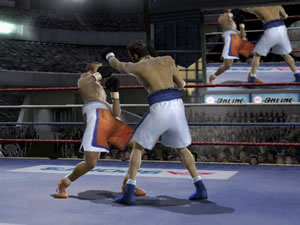Don’t call it a comeback.
Usually when a boxer loses a high profile match, he claims not that he was beaten
by a superior fighter, but rather that there was a flaw in his preparation or
that the guy landed a few lucky punches. It’s all about saving face, even if
that face looks like a giant swollen blueberry after a two-hour meeting…
-
Total Control = totally cool
-
Good graphics
-
No button-mashing!
-
No clinching?
-
Career mode still isn't great
-
Needs more depth










